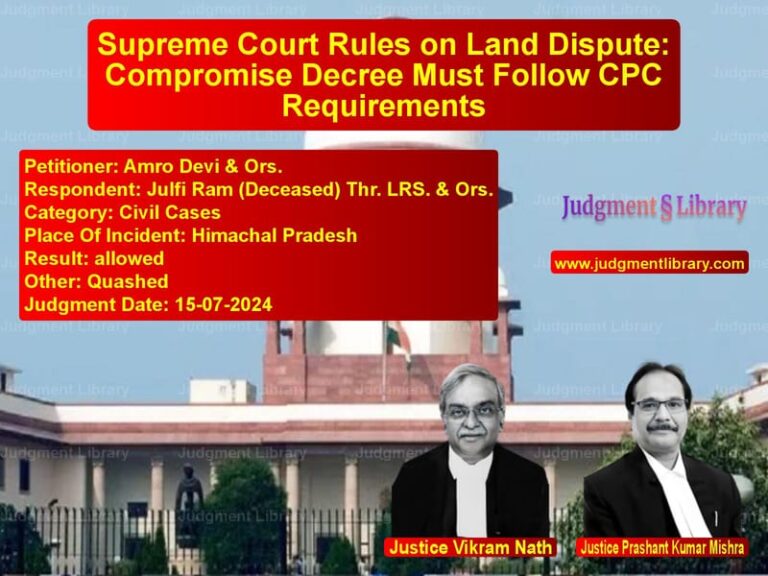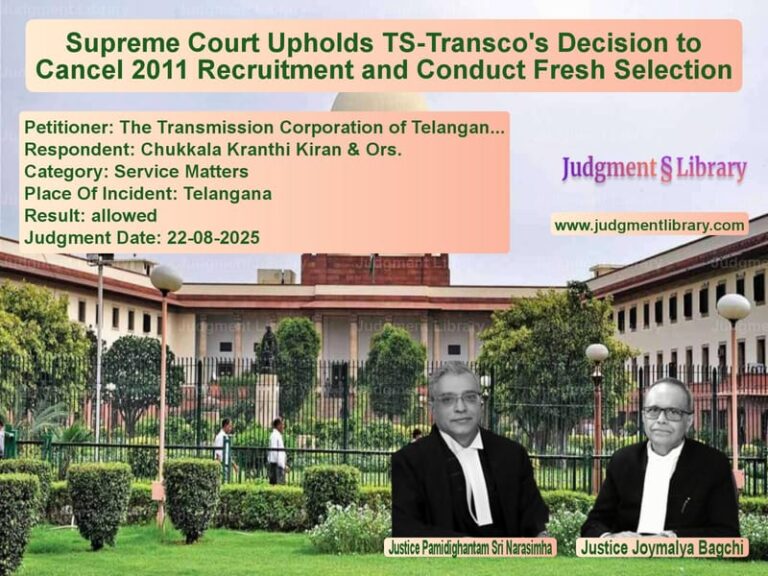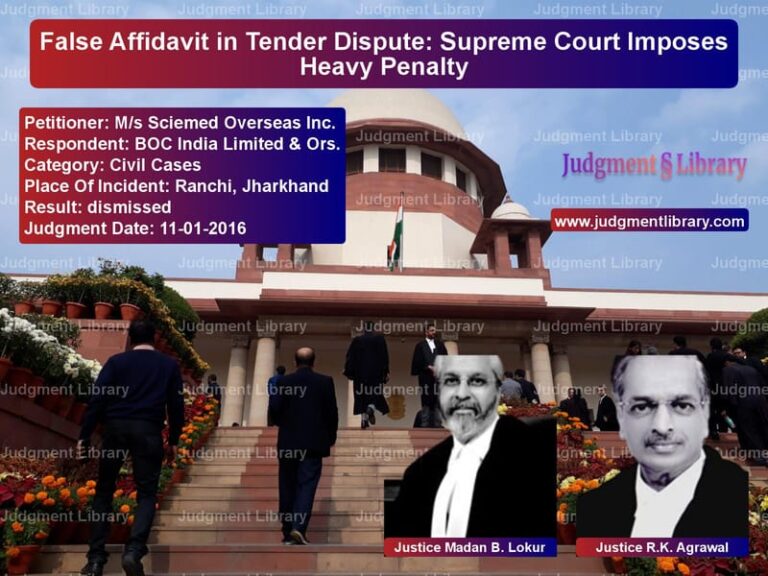Supreme Court Upholds Bar on Insolvency Proceedings for COVID-19 Defaults
The Supreme Court of India, in the case of Ramesh Kymal vs. M/s Siemens Gamesa Renewable Power Pvt. Ltd., upheld the bar on initiating insolvency proceedings for defaults occurring after March 25, 2020, as per the amendment made to the Insolvency and Bankruptcy Code, 2016 (IBC). The judgment, delivered on February 9, 2021, reaffirmed that corporate insolvency resolution processes (CIRP) cannot be initiated for defaults that arose during the pandemic-related economic downturn.
The decision, delivered by a bench comprising Dhananjaya Y. Chandrachud and M.R. Shah, dismissed the appeal and clarified that the suspension of insolvency proceedings under Section 10A of the IBC is absolute for defaults occurring within the stipulated period.
Background of the Case
Claim by the Appellant
The appellant, Ramesh Kymal, claimed that he was entitled to ₹104.11 crores under various employment and incentive agreements signed with the respondent, M/s Siemens Gamesa Renewable Power Pvt. Ltd. He alleged that the company failed to pay his dues upon his resignation on April 30, 2020.
Filing of Insolvency Proceedings
On May 11, 2020, Kymal filed an application under Section 9 of the IBC, seeking initiation of CIRP against the respondent company for non-payment of operational debt.
IBC Amendment and the Bar on CIRP
On June 5, 2020, the President of India promulgated an ordinance inserting Section 10A into the IBC, suspending insolvency proceedings for defaults occurring on or after March 25, 2020, for six months (extendable up to one year). The law explicitly stated that “no application shall ever be filed for defaults during this period.”
Decisions by NCLT and NCLAT
- The National Company Law Tribunal (NCLT) dismissed Kymal’s application, ruling that Section 10A barred any proceedings for defaults occurring after March 25, 2020.
- The National Company Law Appellate Tribunal (NCLAT) upheld the NCLT’s decision on October 19, 2020.
- Kymal appealed to the Supreme Court, arguing that his default began before March 25, 2020.
Supreme Court’s Observations and Ruling
Clarity on Section 10A of IBC
The Court examined the legislative intent behind Section 10A and held that the bar on CIRP applications was absolute. It ruled:
“The proviso to Section 10A states that ‘no application shall ever be filed’ for defaults occurring during the said period. The intent of the legislature was to protect businesses from insolvency proceedings due to financial distress caused by the COVID-19 pandemic.”
Determination of Default Date
Kymal argued that his default should be considered from his resignation date in January 2020. However, the Supreme Court rejected this, holding:
“The date of default, as per the demand notice issued in Form 3, is April 30, 2020. The appellant cannot now claim that the default occurred before March 25, 2020.”
Purpose of Section 10A
The Court noted that the objective of Section 10A was to prevent companies from being pushed into insolvency due to the pandemic-induced economic crisis. It cited the Ordinance’s preamble, which emphasized:
- The nationwide lockdown had disrupted business operations.
- It was difficult to find resolution applicants to revive companies.
- The law aimed to protect distressed companies from unnecessary insolvency proceedings.
Rejection of the Appellant’s Arguments
The appellant contended that the IBC should allow an examination of whether financial distress was caused by COVID-19. The Court rejected this argument, stating:
“Section 10A does not require courts to conduct an inquiry into whether COVID-19 caused the default. The law categorically bars all CIRP applications for defaults arising on or after March 25, 2020.”
Final Judgment
- The Supreme Court dismissed the appeal.
- The ruling reaffirmed that Section 10A is a blanket ban on insolvency proceedings for the specified period.
- The Court emphasized that the IBC’s intent is to protect businesses from the financial impact of COVID-19.
Key Takeaways from the Judgment
- Section 10A of the IBC bars all CIRP filings for defaults occurring after March 25, 2020.
- There is no scope for judicial interpretation to determine if COVID-19 caused the default.
- Businesses affected by the pandemic are protected from insolvency proceedings.
- The intent of the law is to ensure economic recovery and prevent unnecessary liquidations.
- Statutory deadlines and notices are crucial in determining the date of default.
Impact of the Judgment
This ruling strengthens India’s insolvency framework by ensuring that companies are given breathing space to recover from pandemic-related financial stress. It sets a clear precedent that courts cannot override legislative intent when laws are designed to address extraordinary economic crises.
Conclusion
The Supreme Court’s ruling in Ramesh Kymal vs. M/s Siemens Gamesa Renewable Power Pvt. Ltd. is a landmark decision in insolvency law. By upholding the bar on CIRP proceedings for defaults occurring post-March 25, 2020, the Court has reinforced the protective mechanism of the IBC and ensured that distressed businesses have the opportunity to recover without the threat of insolvency.
Petitioner Name: Ramesh Kymal.Respondent Name: M/s Siemens Gamesa Renewable Power Pvt. Ltd..Judgment By: Justice Dhananjaya Y. Chandrachud, Justice M.R. Shah.Place Of Incident: India.Judgment Date: 09-02-2021.
Don’t miss out on the full details! Download the complete judgment in PDF format below and gain valuable insights instantly!
Download Judgment: ramesh-kymal-vs-ms-siemens-gamesa-r-supreme-court-of-india-judgment-dated-09-02-2021.pdf
Directly Download Judgment: Directly download this Judgment
See all petitions in Bankruptcy and Insolvency
See all petitions in Corporate Compliance
See all petitions in Judgment by Dhananjaya Y Chandrachud
See all petitions in Judgment by Mukeshkumar Rasikbhai Shah
See all petitions in dismissed
See all petitions in supreme court of India judgments February 2021
See all petitions in 2021 judgments
See all posts in Corporate and Commercial Cases Category
See all allowed petitions in Corporate and Commercial Cases Category
See all Dismissed petitions in Corporate and Commercial Cases Category
See all partially allowed petitions in Corporate and Commercial Cases Category







